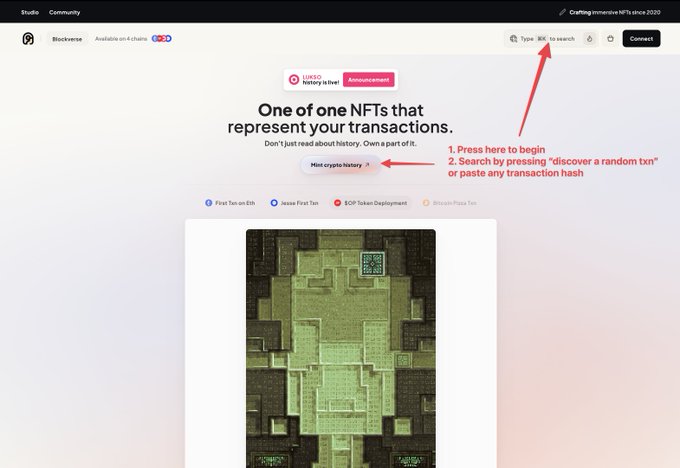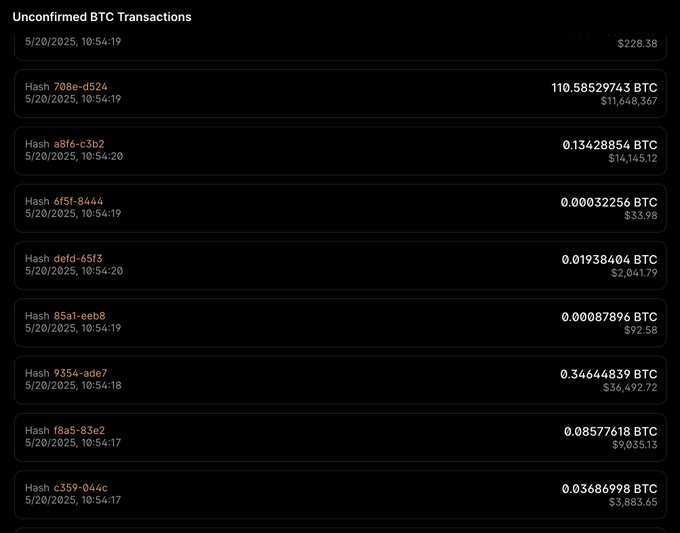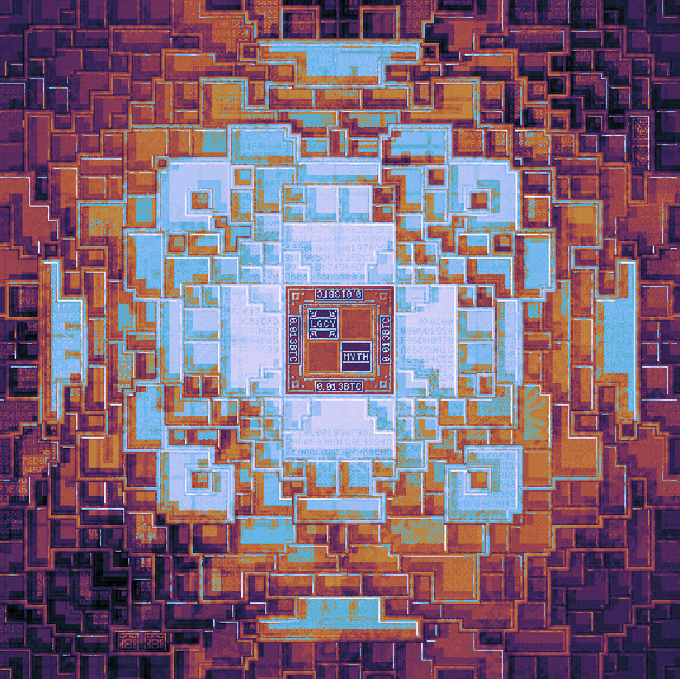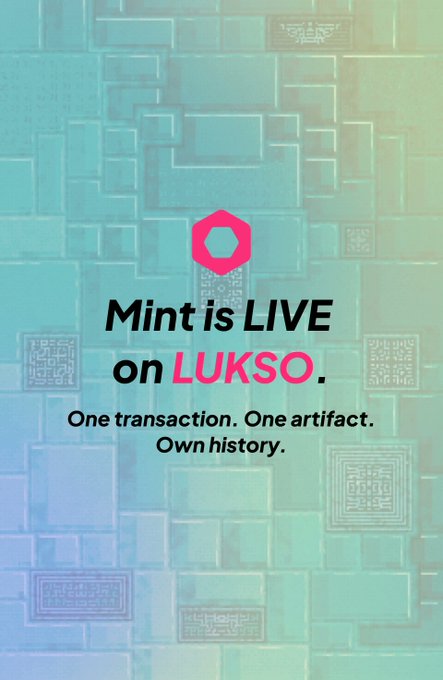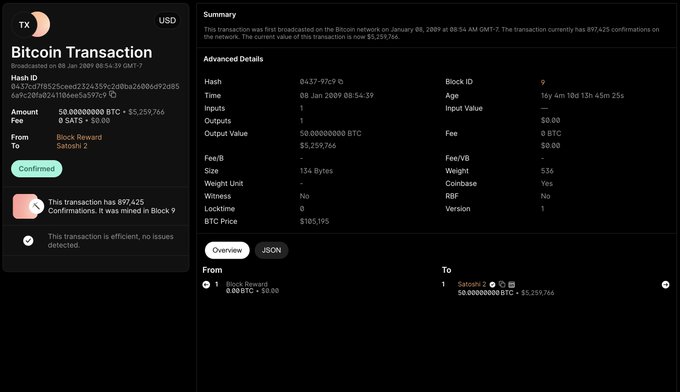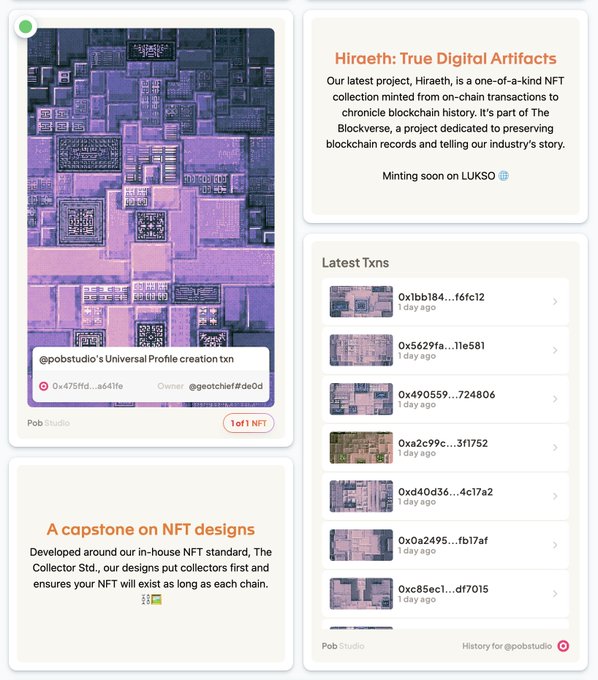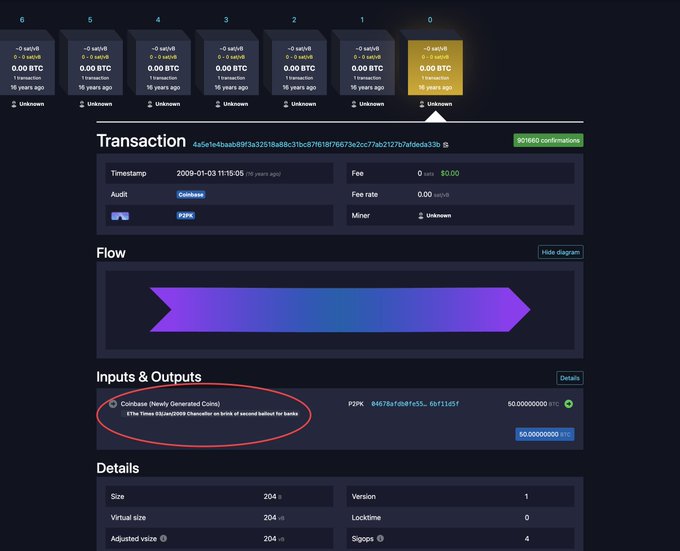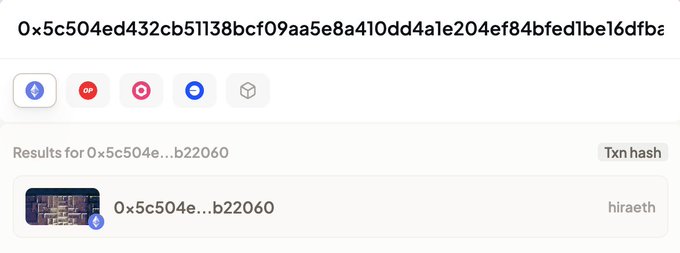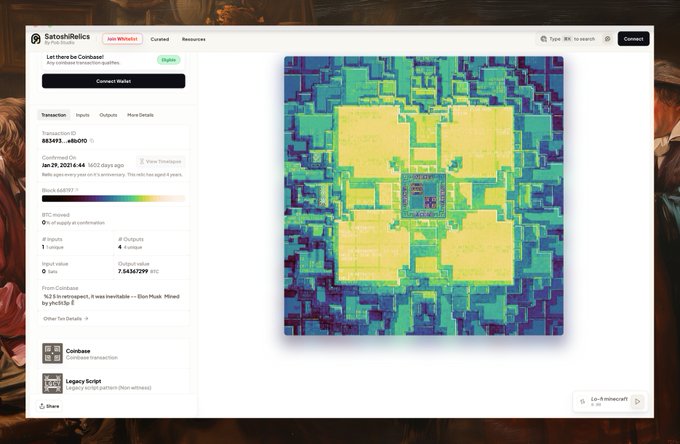Satoshi Relics: Dynamic Bitcoin Ordinals That Age With Time
Satoshi Relics: Dynamic Bitcoin Ordinals That Age With Time
🎨 Bitcoin Art That Ages

A new Ordinal project called Satoshi Relics introduces unique Bitcoin-based artifacts that evolve over time, reflecting the age of their underlying transactions. Each piece is a 1/1 creation that develops a digital patina as years pass.
The project builds on Bitcoin's foundation as both a monetary and historical ledger. Key features:
- Artifacts are generated from Bitcoin transactions, not just stored on them
- Each piece changes yearly, gaining historical character
- Permanent preservation on Bitcoin's secure network
The initiative follows Bitcoin's original spirit, where the first transaction carried a message and timestamp, making it both a financial and cultural artifact.
An Ordinal that reflects the age of the tx that it was made from. Changing year by year, gaining new patina. Bitcoin art made like no other. Each a 1/1. Satoshi Relics. 🟧
Not art about crypto. Art from crypto. Born onchain. Built to last.
2/ “—the blockchain is the most important development in history since the advent of writing itself…” – @balajis Blockchains are ledgers of technological truth. Every action—sent, minted, deployed—is public, permanent, verifiable. Hiraeth transforms that permanence into art.
Digital artifacts made from transactions. Who's it for? For collectors. For historians. For crypto enthusiasts. For those who believe this tech changes everything. This is for you. 🧡
Bitcoin is the archive. Ordinals are the index. Satoshi Relics—the artifacts.
Satoshi Relics Are Coming 🟧 Bitcoin’s greatest moments— The Genesis block. The first P2P transaction. Bitcoin Pizza Day. Each transaction transformed into a 1-of-1 digital artifact. Etched on a sat. Preserved forever as Ordinals. Not another drop. A cultural event. A turning
#Cryptoart is cool… But have you seen art generated by the chain itself? Not uploaded—encoded. Each artifact, mathematically unique.
1/ ✨ Mint is LIVE on LUKSO ✨ Hiraeth has launched on @lukso_io 🧡 Each piece is a one-of-one digital artifact—generated directly from a blockchain transaction. Not just art—history, visualized. One transaction at a time. Only at pob(.)studio. Let’s break it down 🧵👇
This but as art. Not an NFT. A digital artifact. Etched into Bitcoin itself.
“If inscriptions prove, as the authors hope, to be highly sought after digital artifacts with a rich history, they will serve as a powerful hook for Bitcoin adoption: come for the fun, rich art, stay for the decentralized digital money.” — @rodarmor
Ordinals alpha, anon? Not art on Bitcoin—art from Bitcoin. Transactions become artifacts. Immutable. Scarce. Historic. Digital preservation is entering a new era. Read the vision. Tag a collector 👇
Why speculate on Ordinals? Because Bitcoin isn’t just money—it’s memory. Every piece you collect is a permanent mark on the most secure ledger on Earth. Satoshi Relics is history you can hold.
Each Relic is generated from a real Bitcoin transaction. Its colors come from the block. Its form from the txid. Its details from the story it tells. Raw data becomes artifact. History—forged by energy, sealed in time.
Owning blockchain art isn’t just collecting— it’s conviction. An asymmetric bet on crypto’s future. Imagine fading history being minted in real time... 🫠
1/ ✨ Mint is LIVE on LUKSO ✨ Hiraeth has launched on @lukso_io 🧡 Each piece is a one-of-one digital artifact—generated directly from a blockchain transaction. Not just art—history, visualized. One transaction at a time. Only at pob(.)studio. Let’s break it down 🧵👇
Now that Hiraeth mint is live, you can mint digital artifacts from both of our 🆙 Grid Mini-dApps on @lukso_io. Your UP is more than a profile— it’s a record of your onchain identity. Your first step. Your first interaction. Now, a digital artifact—forever onchain. Mint yours
Why store art on Bitcoin? We like to believe this is how Satoshi would have it. The very first transaction carried a message— a timestamp, a protest, an inscription. He led the way. Satoshi Relics follows in that tradition—preserving Bitcoin’s story, one artifact at a time.
Not art about LUKSO. Art made from LUKSO. Every Hiraeth = a transaction. Mint the chain’s history—one artifact at a time. Each hash, an heirloom of @lukso_io. Live now at pob(.)studio Here's how it works 👇
3/ Every Hiraeth artifact begins with a transaction hash. 1. Enter a hash into the dApp 2. It reads onchain data 3. That data becomes generative art 4. You mint it—permanently, onchain You don’t create the artwork. The blockchain does. Hiraeth is blockchain art.
Bitcoin isn’t just a ledger of value— it’s a ledger of events. Of history. And we’re building a way to capture it— one digital artifact at a time.
Our work has matured tremendously over the years 😌 From Hash to Hiraeth to Satoshi Relics, each step has taught us something new about making meaningful onchain art. Now, we're nearly done refining our most advanced work yet—Ordinals on Bitcoin 🟧 Notice anything? gn.
Not just art. History, visualized. One transaction at a time. 1/1 digital artifacts minting now. Here's how 👇
13/ Each artifact is mathematically unrepeatable—a true 1/1 mined from history. The Hiraeth dApp is a multi-chain explorer: 🆙 Connect your Universal Profile 🌐 Browse LUKSO by hash 🎲 Use presets or “I’m Feeling Lucky” Each search returns art. Find a txn. Paste the hash. Mint.
Not made on Bitcoin. Made from Bitcoin. This is our next project’s canvas.
Block 902,373: A New Chapter in Blockchain History

Following the last Bitcoin halving at Block 840,000, Block 902,373 marks a significant milestone in blockchain history. Our explorer now categorizes transactions by weight, with larger transactions designated as Relics. Key features: - Enhanced transaction visualization - Weight-based classification system - Special highlighting for Relic transactions This new approach provides deeper insights into blockchain dynamics and transaction patterns, offering a more structured view of network activity.
Termina Inscriptions Transform into Generative Art

Termina inscriptions have evolved into a new form of generative art, where transaction data becomes the creative medium. Each inscription is uniquely generated from blockchain entropy, creating unrepeatable artistic expressions. The system uses Proof-of-Burn (POB) mechanics to transform transaction details into visual elements, with colors and patterns derived directly from on-chain data. - Each artwork is mathematically unique - Transaction parameters influence artistic output - POB mechanics ensure verifiable scarcity This development marks a significant shift in how blockchain data can be interpreted as creative expression.
First Bitcoin Transaction Anniversary and Hal Finney Tribute

January 13th marked the 16th anniversary of the first Bitcoin transaction, where Satoshi Nakamoto sent 10 BTC to Hal Finney. This historic moment is now commemorated through a unique ordinal - a Satoshi Relic - generated from Hal's first Bitcoin transaction data. The ordinal serves as both an artistic representation and a permanent record of this pivotal moment in cryptocurrency history, preserving Hal Finney's early contributions to the Bitcoin network. - First BTC transaction: January 13, 2009 - Amount: 10 BTC - Participants: Satoshi Nakamoto → Hal Finney - Format: Generative art ordinal *This digital artifact stands as a testament to the early days of Bitcoin and one of its most significant contributors.*
Ordinals Project Evolution: From Hash to Advanced Bitcoin Art

A significant milestone in onchain art development is approaching, with the project evolving from Hash to Hiraeth to Satoshi Relics. The team announces near completion of their most sophisticated work yet on Bitcoin Ordinals. The progression represents years of learning and refinement in creating meaningful blockchain-based art. This follows their earlier announcement of bringing Hiraeth to Bitcoin as historic Digital Artifacts. - Project Evolution Timeline: - Hash - Hiraeth - Satoshi Relics - New Advanced Ordinals Work (Coming Soon) *This development marks a significant step in Bitcoin's artistic ecosystem.*
